Toenail fungus is a fairly common problem for many people. This disease is quite difficult to treat; it is best to try to fight it at the initial stage. Not only ready-made ointments and products sold in pharmacies, but also traditional medicine often come to the rescue.
Usually, in the very early stages of the development of the disease, traditional medicine helps very well. But still, sometimes you shouldn’t rely on chance, but it’s better to consult a doctor.
Iodine in the fight against fungus
Perhaps alcohol tincture of iodine is the most common method of treating nail fungus. It is such a common remedy because its fungicidal property has long been proven.Also, when exposed to iodine, the protein quickly coagulates and is destroyed.In this case, the fungus fully corresponds to the protein structure, which is why iodine does an excellent job of destroying it.
Iodine is famous for its low price; it can be purchased at almost any pharmacy kiosk. Iodine does an excellent job and restores not only the nail plate, but also the interdigital area and areas of the feet that have been damaged.
But it is also important to know about some features:
- Iodine, of course, copes well with fungus, but is not able to remove all types of this disease.
- Sometimes iodine causes an allergic reaction. Therefore, it is very important to conduct an allergy test before using it. You just need to put a few drops of iodine on the bend of your elbow. If a burning sensation or other adverse reactions suddenly appear, then it is best not to use iodine to get rid of the fungus.It is better to choose another option and treatment regimen for yourself.
- After applying iodine, the nail plate is painted yellow.
- Sometimes you can get burned and dermatitis appears.
- Iodine can be used in the fight against fungus only when the disease has begun to spread. Iodine will help if only a third of the plate is affected.
To combat this, you can choose one of the treatment methods
- First way. An alcohol solution with a concentration of 5% is dripped onto the affected areas of the skin 2 times a day. 1 drop is enough for one area. A cotton swab will help simplify the procedure. Iodine is also dripped onto a healthy plate, just once every 2 days.
- Second way. Add iodine to hot water and steam your feet for no more than 15 minutes. The nail will become very soft and elastic, now you can cut it off. Hydrogen peroxide with a concentration of 3% is applied to the remaining areas of the skin. The final stage of fungus removal is applying a bandage with an antibacterial ointment.
- Third way. 6 weeks is the treatment period. Castellani liquid is used in the first two weeks of treatment. Then the nails are treated with iodine for another 2 weeks. For the final 2 weeks, treat the nail plates with a 9% vinegar solution.
- Fourth way.To prepare the solution, you need to take a small jar or bottle. Add a spoonful of salt, preferably a teaspoon. Then add garlic juice, vinegar essence and chloronitrophenol in the same amount. The nail treatment solution is ready. Now you need to steam your nails and remove loose areas. The affected areas are treated at night. And don't forget to shake the product before use.
- Fifth method. This treatment method will take 1 month. You need to learn how to make special salt baths for nails. Dissolve 2 tablespoons of sea salt and 1 tablespoon of soda in 1 liter of water. It is best to take a bath in the evening; your feet should be steamed for about 30 minutes. Next, you need to lower the nail file into the water and sand the nail plate, and use scissors to remove all loose areas.
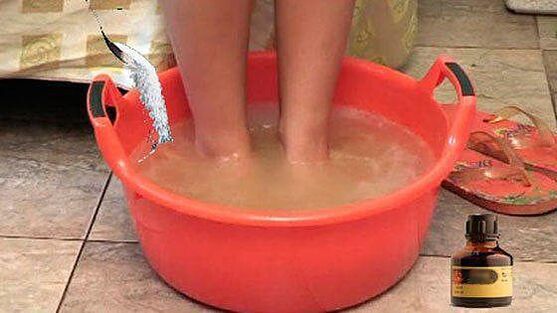
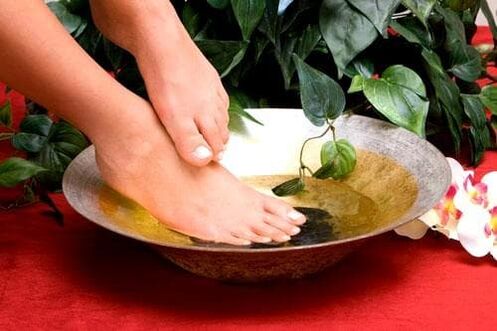
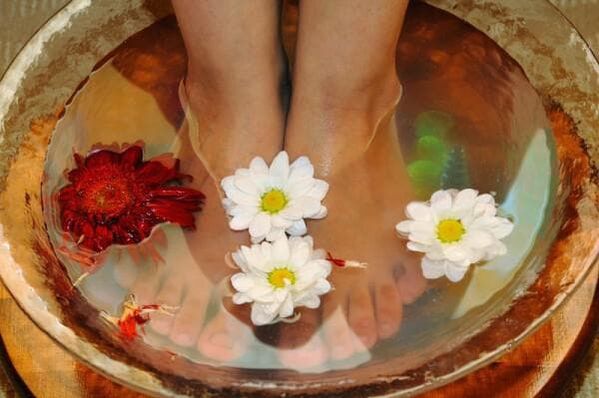
After this treatment, the feet are thoroughly washed with soap. Now it is better to use gloves. They are put on the hands and the entire leg is treated with iodine, that is, the foot, nails, and interdigital spaces. Those areas where the fungus has particularly affected the leg should be treated 3 times with iodine. After the first layer of iodine has dried, a second one is applied.
Kombucha treatment
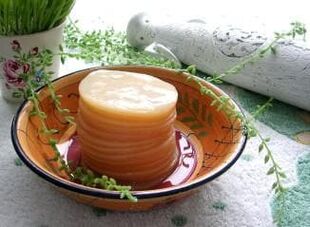
Kombucha, prepared correctly, has a number of positive and beneficial properties.One of these properties is that kombucha is excellent at killing bacteria.
That is why in folk medicine they began to use this remedy for nail disease. Kombucha is used either as a compress or by rubbing into the nail plate.
- For treatment, you need to tear off a small piece of kombucha, remove the film from it and grind to a fine state, similar to porridge. This paste is used for rubbing into the affected areas of the skin. They do this three times a day.
- Compresses also do an excellent job of fighting fungus.. You only need to take one layer of mushroom. After this, it is soaked in clean water. It is recommended to do further manipulations in the evening. A small piece of mushroom is placed on the nail on the affected area of the nail plate. Then they put cellophane and a few socks on top. The entire compress is left to act overnight. There will be pain, so you will need to endure it. In the morning, you need to remove the compress and wash your feet thoroughly in water. Now you can remove all affected dead areas. After this, the nails need to be treated with brilliant green or potassium permanganate.In this case, the concentration of these solutions should be quite high. Usually the entire course of treatment takes from 3 days to 7 days. And for the purpose of prevention, the treatment is carried out for a couple more days.
Copper sulfate
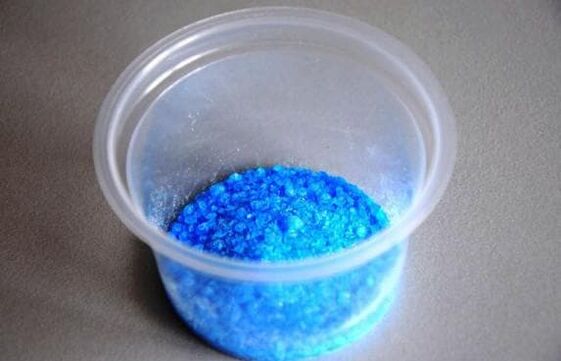
This remedy can fight infection and eliminate foot fungus. In practice, you can often find treatment of fungus with copper sulfate and mushroom together. Copper sulfate is used for control in the form of a solution or as an ointment.
- Preparing the solution is not difficult. To do this, dissolve 1 teaspoon of copper sulfate in 1 liter of water. The result is a concentrated solution. Before using it, you need to dilute the product. For 1. 5 liters of water you need to take 1 spoon of concentrate. It is recommended to use warm water for the bath. The duration of the procedure is 15 minutes.
- To prepare the ointment, you need to take 1 teaspoon of vitriol and place it on a pre-heated frying pan.. As a result, the color of the vitriol should change to gray or white. Now you need to add a little goose fat or tar and 1 teaspoon of yellow sulfur, which is sold in powder form. All ingredients need to be heated, and the result will be an ointment. It is used for processing.
Tar soap and birch tar
Birch tar has long been used as a good antiseptic and anti-inflammatory. It is also able to soften the nail plate very well. In folk medicine, it is recommended to apply birch tar in its pure form to the nails.
But before that, the feet need to be well treated. To do this, prepare a soap bath and steam your feet in it for 15 minutes. Now they remove dead skin from the feet and trim the nail plates that have become soft.The feet are wiped very well, paying special attention to the area between the toes.Now, using a stick, take birch tar, carefully distribute it over the affected surfaces and rub in a little.
Now you need to not put on your shoes for 1. 5 hours and not move at all. A good result can be achieved if the ointment is absorbed into the skin on its own under the influence of air. After this, you need to wear socks made only from natural ingredients. After a couple of days, your feet should be washed in cold water. Then the whole process is repeated again. A faster result can be achieved if you also treat the insoles with tar.
You can also use sulfur-tar ointment. To do this, you need to mix 3 parts of tar, 10 parts of any fatty base and 2 parts of sulfur powder. The ingredients are mixed well and heated. The result should be a mixture of homogeneous composition. The resulting ointment is applied to the nail and sealed with a band-aid on top.
Table and sea salt
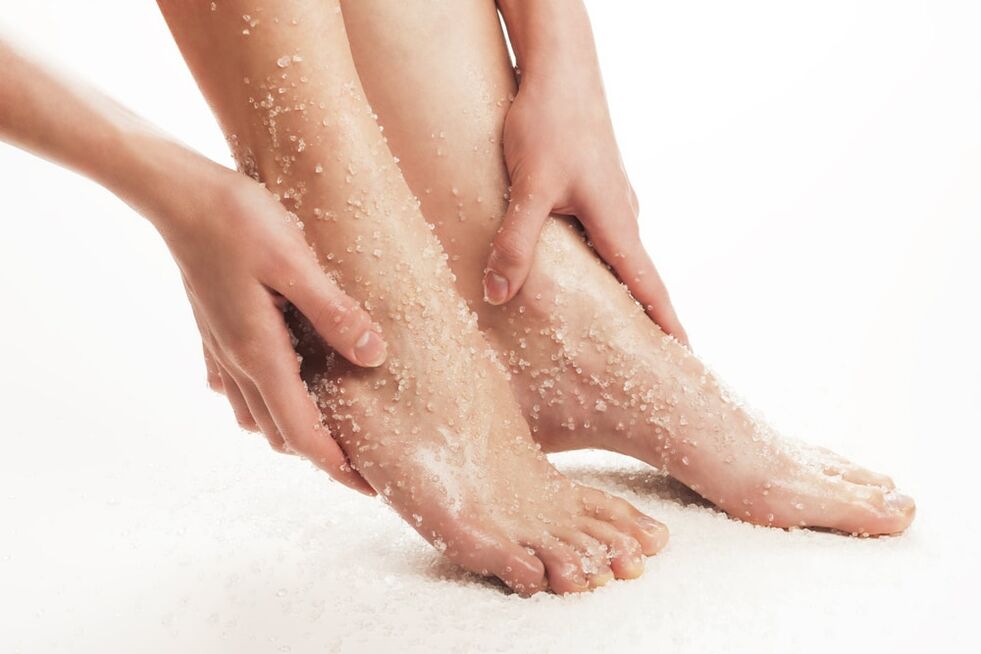
Each type of salt performs its own function. Sea salt can soften the nail plate and have an antiseptic effect.Regular table salt can remove all pathogenic flora.To a greater extent, these remedies cannot cure fungus on their own; they only exhibit an auxiliary function.
- To carry out the steaming procedure, you need to make a solution for the bath. To do this, dilute 1 spoon of sea salt in a glass of water. Now a cotton swab is moistened in the prepared solution and applied to the nail for 5 minutes. Now you need to douse your nails with a soda solution.The entire course should take 10 days. Sometimes you may feel a slight itching and slight burning sensation.
- Sea salt and essential oils. Baths based on these components are also made for 10 days. 1. 5 tablespoons of salt are required per liter of water. The salt crystals should completely dissolve. Now you need to add a teaspoon of essential oil to this saline solution. Instead, you can take 0. 25 ml of iodine or 1 teaspoon of lemon juice.
- If the case is particularly advanced, then garlic will come to the rescue. Dilute 1 tablespoon of salt in one glass of water and add one clove of garlic, after crushing it.
Celandine
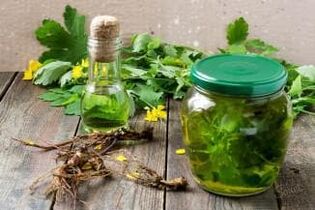
If you read the information about celandine, you will find out that it is poisonous. But when used in the right and reasonable concentrations, it can have a healing effect. Even experts say that celandine can be used in the fight against nail fungus.
The plant is picked and chopped using a meat grinder. Now all the pulp needs to be squeezed out through 4 layers of gauze to get juice. You will need about 200 ml of juice. The same amount of 70% alcohol solution is mixed with celandine.The mixture should be infused throughout the day. The resulting solution is used to treat nail plates.As in other cases, the nails need to be prepared and steamed, and then dried. You need to do about 4 treatments per day. Such procedures are carried out until the nail grows and becomes healthy.
Everyone chooses a more suitable method of treatment for themselves, but you should be careful about any chosen method.























